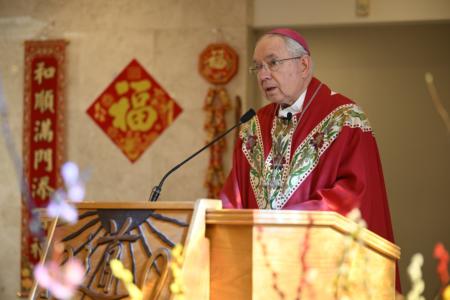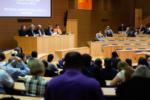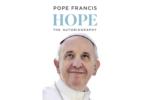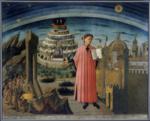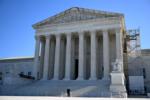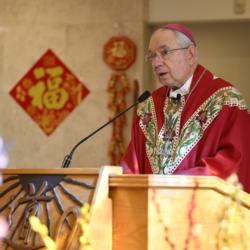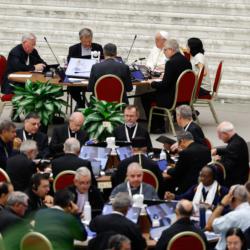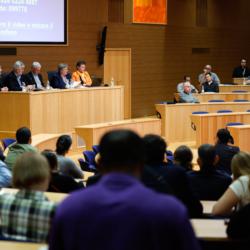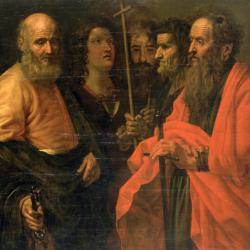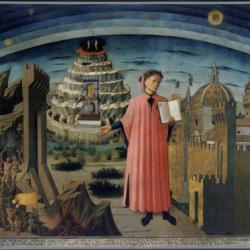U.S. bishop: Church needs decentralization, not doctrinal fragmentation
VATICAN CITY (CNS) -- The decentralization of certain aspects of the Catholic Church's governance, as proposed in the Synod of Bishops on synodality, should not lead to a decentralization of doctrine, said the former chair of the U.S. bishops' Committee on Doctrine.
Allowing different bishops' conferences to teach varying doctrines "would be disastrous," said Bishop Kevin C. Rhoades of Fort Wayne-South Bend, Indiana, a synod member and member of the U.S. bishops' doctrine committee.
Speaking with Catholic News Service Oct. 16 during ongoing synod discussions on the church's mission and its dynamic relationship with local cultures beyond hierarchical models, Bishop Rhoades said he does not expect any changes in the doctrinal authority of a bishop or bishops' conference emerging from the synod.
"Fragmentation in matters of faith and morals would be really against the will of our Lord and really hurt our mission, especially our mission of evangelization in a divided world," he told CNS. "We should be a sign of unity in a divided world."
The working document for synod said that one of the proposals that has emerged calls for the "recognition of Episcopal Conferences as ecclesial subjects endowed with doctrinal authority, assuming socio-cultural diversity within the framework of a multifaceted Church."
The idea was already present in Pope Francis' 2015 post-synodal apostolic exhortation "Evangelii Gaudium" ("Joy of the Gospel"), seen as a roadmap for his pontificate, in which he wrote that the contribution of bishops' conferences to the universal church as envisioned in the Second Vatican Council "has not been fully realized, since a juridical status of episcopal conferences which would see them as subjects of specific attributions, including genuine doctrinal authority, have not yet been sufficiently elaborated."
Bishop Rhoades said that developments in the role of bishops' conferences must adhere to the "sound decentralization" outlined in the synod's working document. Quoting the pope's 2022 apostolic constitution "Praedicate Evangelium" ("Preach the Gospel"), the document stated that such decentralization means leaving "to the competence of Bishops the authority to resolve, in the exercise of their proper task as teachers and pastors, those issues with which they are familiar and that do not affect the Church's unity of doctrine, discipline and communion."
Sound decentralization, Bishop Rhoades said, would not involve changing doctrine as a bishops' conference, but asking how to apply principles of doctrine to a specific culture, especially in a pastoral context, "because we are all living in different cultures, so there needs to be some decentralization."
Such decentralization can be promoted through existing synodal structures outlined in canon law, he said, such as parish pastoral councils, which "should be mandated." Other structures like diocesan synods, he added, are underutilized in U.S. dioceses.
"They are not new structures, and those that we do have we can use better," he said. "One of my hopes is that we will use these bodies, these synodal councils, more effectively, more deeply and not just (in) some kind of 'pro forma' (way) but to really be an impetus for mission."
Speaking of the context in the United States, he said that the communion between the U.S. bishops and Pope Francis "on the protection of human life and dignity is very strong."
At their 2023 fall general assembly, U.S. bishops were asked if topics such as addressing climate change and supporting immigration, major concerns for the pope, were downplayed in their document "Forming Consciences for Faithful Citizenship," which stated that the threat of abortion remains the U.S. bishops' "preeminent priority" in guiding Catholic voters.
Yet Bishop Rhoades said, "I don't really see a divergence" between the priorities of the U.S. bishops and the pope. "I think though that there are different cultural contexts, and the pope is the pope of the universal church."
Abortion, the bishop said, "has been a very preeminent issue for us as an episcopal conference in the United States" due to the overturning of Roe v. Wade.
"I think the pope is looking at the whole, and he speaks on behalf of the unborn very strongly but also on behalf of migrants," he said. "I honestly think we are on the same page."
